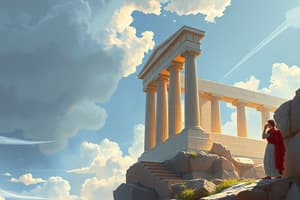Podcast
Questions and Answers
What period of ancient Greek history is referred to as the Classic Age?
What period of ancient Greek history is referred to as the Classic Age?
500 to 323 BCE
What was a key feature of the city-states of Athens and Sparta during the Classic Age?
What was a key feature of the city-states of Athens and Sparta during the Classic Age?
Independence
Who is credited with developing the concept of democracy in Athens?
Who is credited with developing the concept of democracy in Athens?
The Athenians
Which famous philosophers contributed to the development of Western philosophy during the Classic Age?
Which famous philosophers contributed to the development of Western philosophy during the Classic Age?
What type of entertainment emerged during the Classic Age?
What type of entertainment emerged during the Classic Age?
What architectural styles emerged during the Classic Age?
What architectural styles emerged during the Classic Age?
What was the significance of the Persian Wars for Greece?
What was the significance of the Persian Wars for Greece?
What was the legacy of the Classic Age for Western civilization?
What was the legacy of the Classic Age for Western civilization?
Flashcards are hidden until you start studying
Study Notes
Definition and Time Period
- The Classic Age refers to the period of ancient Greek history from 500 to 323 BCE.
- It is characterized by the development of democracy, philosophy, theater, and the arts.
Key Features
- Rise of City-States: Independent city-states, such as Athens and Sparta, emerged and flourished.
- Democracy: Athens developed the concept of democracy, where citizens had the right to participate in governance.
- Philosophy: Famous philosophers like Socrates, Plato, and Aristotle contributed to the development of Western philosophy.
- Theater: Tragedy and comedy emerged as popular forms of entertainment, with playwrights like Aeschylus, Sophocles, and Euripides.
- Art and Architecture: The Classic Age saw the development of iconic architectural styles, such as the Doric, Ionic, and Corinthian orders.
Significant Events
- Persian Wars (499-449 BCE): A series of conflicts between Greece and the Persian Empire, which resulted in Greek independence.
- Peloponnesian War (431-404 BCE): A devastating conflict between Athens and Sparta that weakened both city-states.
Notable Figures
- Pericles: Athenian statesman who oversaw the construction of the Parthenon and promoted the arts.
- Socrates: Philosopher who developed the method of questioning and dialogue, known as the Socratic method.
- Aristotle: Philosopher and student of Plato who made significant contributions to fields like biology, ethics, and politics.
Legacy
- The Classic Age laid the foundation for Western civilization, influencing art, literature, philosophy, and politics.
- Its cultural and intellectual achievements continue to shape contemporary society.
Definition and Time Period
- The Classic Age of ancient Greek history spanned from 500 to 323 BCE.
Key Features
- City-states like Athens and Sparta emerged as independent entities, governing themselves.
- Athens developed democracy, where citizens had the right to participate in governance, making decisions, and exercising power.
- Philosophy flourished, with famous philosophers like Socrates, Plato, and Aristotle contributing to the development of Western philosophy.
- Theater emerged as a popular form of entertainment, with tragedy and comedy genres, featuring renowned playwrights like Aeschylus, Sophocles, and Euripides.
- The Classic Age saw the development of iconic architectural styles, such as the Doric, Ionic, and Corinthian orders, which became characteristic of Greek architecture.
Significant Events
- The Persian Wars (499-449 BCE) were a series of conflicts between Greece and the Persian Empire, resulting in Greek independence and autonomy.
- The Peloponnesian War (431-404 BCE) was a devastating conflict between Athens and Sparta that weakened both city-states, causing significant damage to their infrastructure and economy.
Notable Figures
- Pericles was an Athenian statesman who oversaw the construction of the Parthenon, a iconic architectural achievement, and promoted the arts, fostering a cultural renaissance.
- Socrates was a philosopher who developed the method of questioning and dialogue, known as the Socratic method, which became a cornerstone of Western philosophy.
- Aristotle was a philosopher and student of Plato who made significant contributions to various fields, including biology, ethics, and politics, shaping the development of Western thought.
Legacy
- The Classic Age laid the foundation for Western civilization, influencing art, literature, philosophy, and politics, shaping the course of human history.
- The cultural and intellectual achievements of the Classic Age continue to shape contemporary society, remain relevant, and inspire new generations.
Studying That Suits You
Use AI to generate personalized quizzes and flashcards to suit your learning preferences.




